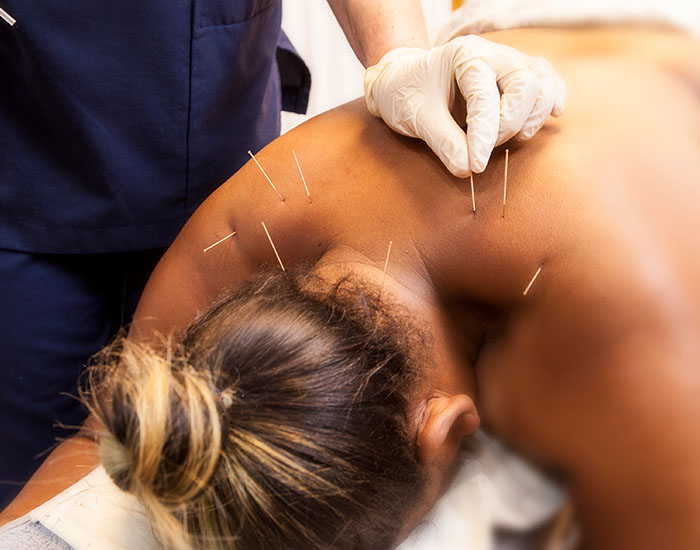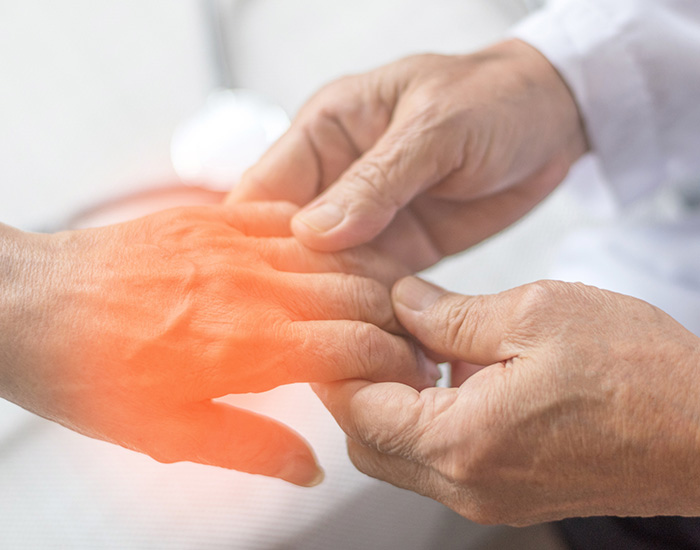Acupuncture
Reduce Anxiety, Stress, Irritability, and More
Acupuncture is one of several healing techniques from Traditional Chinese Medicine (TCM). It is based on theories that describe the cosmos, the earth, and the body in terms of two opposing forces: yin and yang. When these forces are in balance, the body and the mind-spirit are balanced and healthy.
Many acupuncture points are adjacent to nerves, arteries, veins, lymph nodes, and/or on trigger points. This explains why it resolves pain and stimulates nerve, lymph, and blood flow. It also releases “happy, pain-relieving neurotransmitters”, like endorphins and dopamine, thus positively altering brain-body chemistry, reducing anxiety, stress, irritability, and psycho-immunological conditions.

How Acupuncture Works
In accordance with TCM, Qi, (pronounced “chee”), or energy, flows naturally along specific pathways used in acupuncture referred to as meridians and channels. This constant flow of qi maintains the balance between yin and yang throughout the body. If qi is blocked it leads to pain, lack of function, or illness. Acupuncture releases blocked qi or gathers it where it is needed, thus inciting the body’s innate healing responses, restoring homeostasis. Acupuncture usually does not leave marks except for an occasional small bruise at the site of the (hair-thin) needle.
Acupuncture is recognized by the National Institutes of Health for its safety and efficacy in treating a multitude of conditions. It is also found in hospitals and integrated clinics across the Americas, Europe and Asia.

Conditions Treated With Acupuncture
Research indicates the benefits of acupuncture. It can successfully treat any of the conditions listed below:
- Hypertension
- Stress
- Sciatica
- Muscle Spasm
- Joint Pain/Arthritis
- Neck or Low Back Pain
- Tendonitis
- Sciatica
- Plantar Fasciitis
- Sprains/Strains
- Headaches
- TMJ
- Carpal or Ulnar Tunnel
- Neuropathy: Numbness and Tingling
- Allergies
- Infertility
- Premenstrual Syndrome (PMS)
- Menopause Symptoms
- Inducing Labor
- Bell’s Palsy
- Trigeminal Neuralgia
- Post-Stroke Related Symptoms
- Symptoms Related to Chemotherapy
- Addiction: Tobacco, Alcohol, Food
- Gastrointestinal Issues
Frequently Asked Questions Regarding Acupuncture
-
What to expect during an initial acupuncture exam?
Dr. Greene will ask you specific questions about your health history. She will observe your tongue, feel your pulse, muscles, and acupoints, and she may perform additional exams such as ROM and orthopedic and neurological tests. This unique assessment will lead to her recommendation for a treatment plan. This exam may take more than one hour.
For best results please do not wear lotions, make-up, and perfume both for the exam and acupuncture appointments. It is best to eat and drink 1-2 hours before your visit.
-
What to expect during an acupuncture visit?
After her report of findings, Dr. Greene will apply alcohol to areas where she will insert hair-thin, sterilize needles often only millimeters to centimeters below the skin at prescribed acupoints. A majority of people feel no or minimal discomfort from the needles. The needles remain in place for 15 to 45 minutes depending on the desired outcome. Pain conditions require more time. During treatment, you may feel very relaxed or fall asleep. Patients often report other pleasing sensations or an emotional release.
-
How often will I need treatment?
The frequency of visits differs based on conditions and how you present at each appointment. Some people experience dramatic relief after their first treatment, even for long-standing conditions. Some complex or chronic conditions often require one to two treatments per week for several months. Acute cases require fewer and more frequent visits such as two-three times per week for several weeks.
Please tell Dr. Greene if it is your first time, or if you are nervous about treatment. She will work with you, and your breath to relax you.
-
What to expect during follow-up acupuncture treatments?
Follow-up visits require a short history and exam, 5-20 minutes. If a new condition is present, a longer exam is necessary. Please let us know if you have a new symptom before your appointment, so we may schedule a focal or comprehensive exam.
